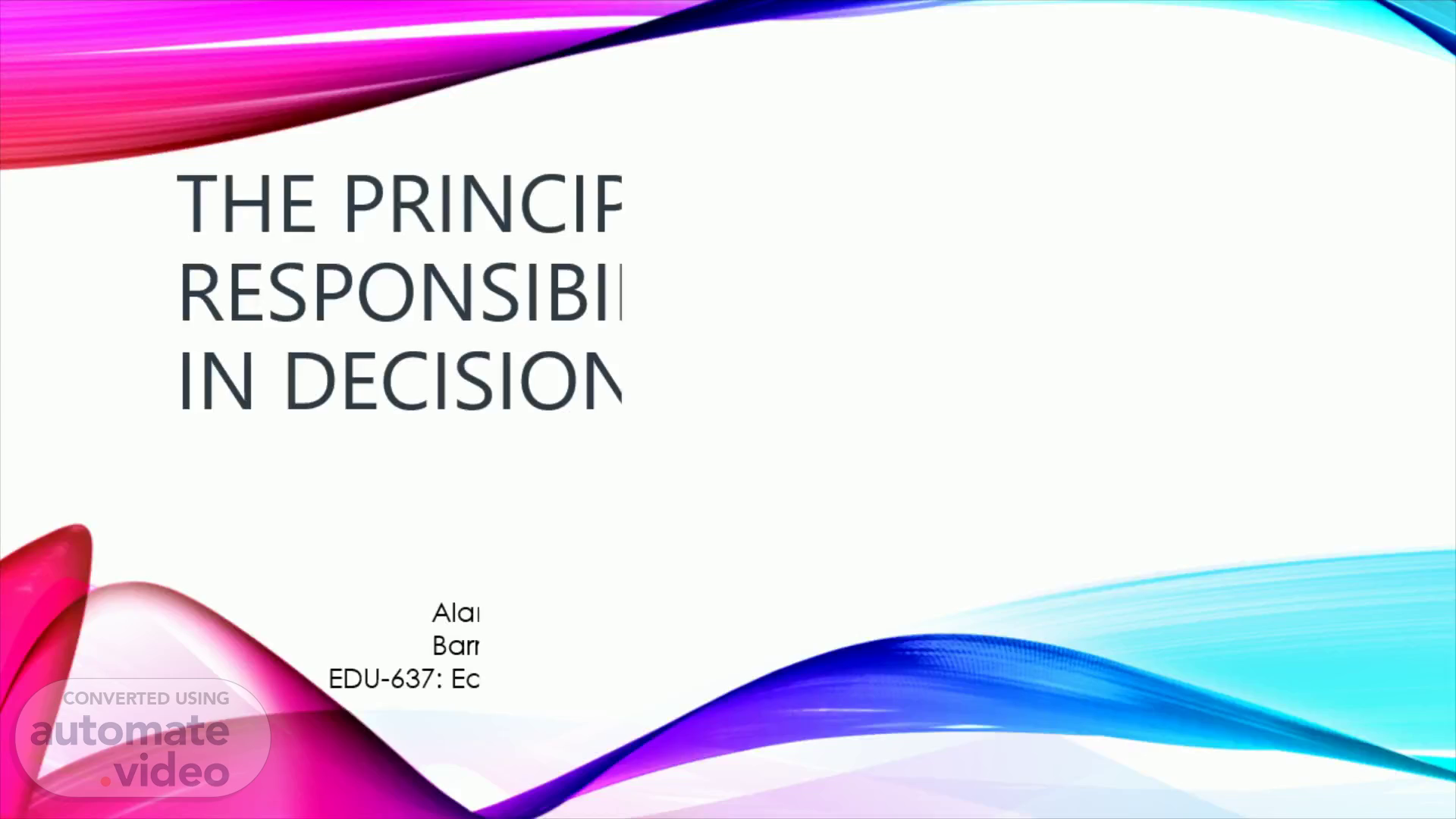
The Principal's Role and Responsibilities in Decision Making
Scene 1 (0s)
The Principal’s R ole and Responsibilities in Decision M aking.
Scene 2 (9s)
I. S pecial S ervices for Special S tudents (Chapter 8).
Scene 3 (17s)
Implementation of Legal Best Practices. Know key laws: -Family Educational Rights and Privacy Act, Section 504, IDEIA/IDEA Know rights of parents and students , especially concerning discipline Be familiar with key components of the IEP (Individualized Education Plan): -Primary disability, FBA/BIP, Services and Related Services, Student Present Levels, Goals, Accommodations/Modifications.
Scene 4 (36s)
Be familiar with psychoeducational assessments and other screenings/assessments intended for eligibility and reevaluation Stay up-to-date regarding common disabilities, their attributes, needs, and necessary services Be aware of IEP and 504 processes (identification, meeting notifications, evaluations, signature sheets).
Scene 5 (50s)
Role of School Staff in Holistic Services. Provide continuum of services with consistency Principal sets the tone of inclusion : acceptance, caring, responsive, receptive, fairness Participate adequately in IEP team (includes administrator and general education teacher) Include parent in decision making process ; communicate effectively with parent outside of required meetings.
Scene 6 (1m 7s)
Facilitate team mentality of services for the care of student and student academic progress Network with outside of school agencies Provide professional development for all teachers (familiarity with disabilities, role, accommodations, scaffolding).
Scene 7 (1m 19s)
Considerations for Effective Inclusion. Principals should consider: Creating time for special education teachers to meet with all subject teachers to discuss student data, student needs, student accommodations, assist with creating scaffolds and supports Providing regular professional development for teachers for strategies for special education students Parental outreach and education , providing parents with an overview of school-based service models, meeting with teachers, and discussing expectations Creating a tone of maintaining high academic and behavioral expectations of students while accommodating for disabilities and unique needs.
Scene 8 (1m 43s)
Future Areas of Research: Effectiveness of Universal Design Learning Effectiveness of Co-teaching Models Best Service Models (subjects for support, co-teaching, Least Restrictive Environment levels of service).
Scene 9 (1m 54s)
II. Professional Development (Chapter 9).
Scene 10 (2m 2s)
Important Notes on Professional Development for Administrators: Teachers must be assessed individually to determine stages, areas of needed support, and areas of needed development. Administrators should avoid standardization of professional development and consider the following when determining appropriate professional development and evaluation procedures..
Scene 11 (2m 17s)
Professional Development Vs Professional Support.
Scene 12 (2m 31s)
Cycle of Evaluative Techniques corelated with Teacher Needs then matched with Professional Development.
Scene 13 (2m 51s)
Corelated Professional Stages and Professional Support by Administration.
Scene 14 (3m 13s)
Considerations for Principals. Article: Professional Development to Professional Learning ; Using teacher needs to creating meaningful learning opportunities for continued growth and development of teachers COMMENTARY: Evolving from professional development to professional learning . (n.d.). EdSource . Retrieved July 7, 2022, from https://edsource.org/2013/evolving-from-professional-development-to-professional-learning/32586#:~:text=A%20key%20element%20in%20Greatness%20by%20Design%20is .
Scene 15 (8m 13s)
References. COMMENTARY: Evolving from professional development to professional learning . (n.d.). EdSource . Retrieved July 7, 2022, from https://edsource.org/2013/evolving-from- professional-development-to-professional- learning/32586#:~:text=A%20key%20element%20in%20Greatness%20by%20Design%20is No More Bad Coffee: Professional Development That Honors Teachers: Sheryl Chard at TEDxABQED . (n.d.). Www.youtube.com. https://youtu.be/aiW0s6_83dw Ubben, G., Hughes, L., & Norris, C. (2016). The principal: Creative leadership for excellence in schools (8 th ). Boston, MA: Pearson. (ISBN-13:978-0-13-348899-9).